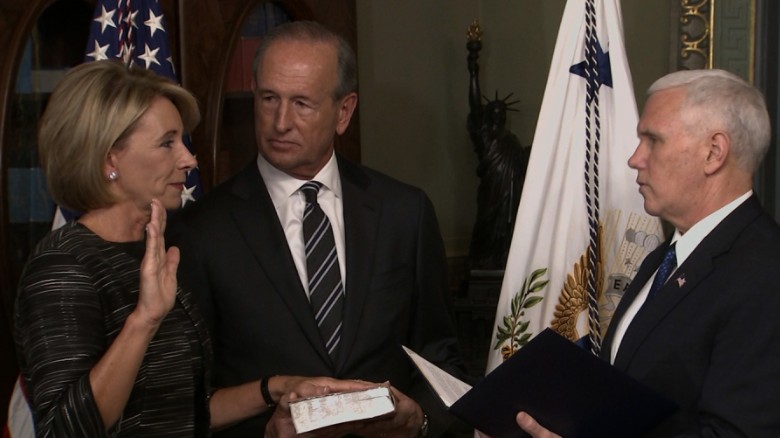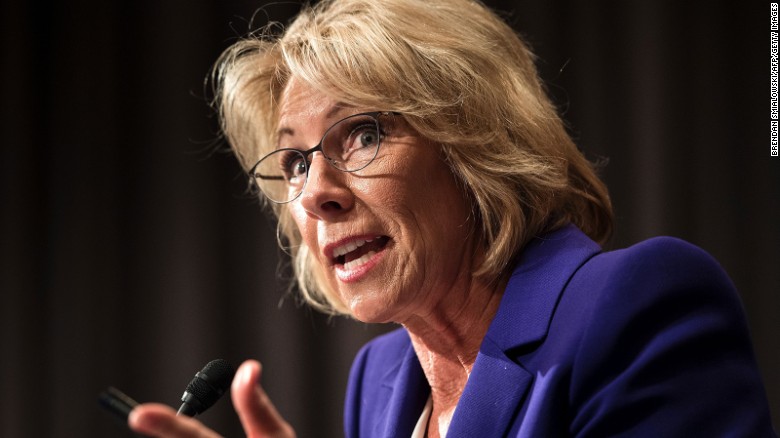Betsy DeVos and Special Education
It may be an understatement to say President Trump has made controversial decisions since his election win on November 8th. From reformed immigration policies to the revamping of financial legislation, no decision has seen such widespread resistance from the right and left than the nomination and confirmation of Betsy DeVos to head the Department of Education. Since her nomination, Ms. DeVos has seen significant challenges to her ability to lead the Department from teacher unions and parent groups across the nation. A confrontational confirmation hearing with members of the Senate was largely covered by the media and shared across social media. Despite comments on grizzly bears and misunderstanding of federal law, a very important question lingers: How will special education be impacted by a DeVos Department of Education.
To contemplate the future of special education with DeVos at the helm, one must first look at her past. Ms. DeVos has been a prominent member of the Republican Party in Michigan since the early 1980s, devoting time and money to conservative party members and movements. Despite never attending or working in public education, Ms. DeVos has dedicated the past thirty years of her life to reforming the education system in her home state. Most notably, Ms. DeVos has advocated for school choice, a hotly debated system where students subsidize private school tuition through publicly funded vouchers. Over the past twenty years, this system gave rise to for-profit charter schools across the country. Her faith in such a system is what raises the question of whether or not she will pursue a national school choice system and if so, how will federal special education law, such as the Individuals with Disabilities Education Act (IDEA), translate into it.
School Choice
School choice is nothing new to those working in education but is still a heated issue. The movement stems from inner cities, where schools struggle to perform. Students, due to economic and geographic restraints, have no other option but to attend these failing public schools. With a state funded school choice system students are able to attend non and for-profit charter schools with financial support from the state through a voucher system. Ideologically the system makes perfect sense. By allowing students a choice to attend schools better fit to their needs the public school system, now in competition with new charter and private schools, break from complacency and adapt curriculum and programs to better serve their students. In essence, school choice creates a free market of public education.
What is most controversial of Ms. DeVos is not her support of school choice across the country, but her responses to members of the Senate during her now notorious confirmation hearing. To many, this hearing was a first glimpse of Ms. DeVos in action and her performance was alarming. When pressed by members of the Senate on charter school education and their legal responsibilities under IDEA, Ms. DeVos’ struggled to formulate descriptive answers and at times showed a lack of overall knowledge of the law itself.
Watch DeVos fail her final exam on special education in front of Senate
Two Foreseeable Issues
With Ms. DeVos at the head of the Department of Education two foreseeable issues arise:
- Will the laws set forth in the IDEA be amended to allow states to determine appropriate standards and
- Will privately funded charter schools fall under the jurisdiction of IDEA or function independently as traditional private schools.
The latter was addressed during an exchange with Senator Tim Kaine of Virginia during Ms. DeVos’ congressional hearing in late January. When asked if she would support equal accountability in all K-12 schools, public, private or charter, Ms. DeVos’ answered ambiguously at best. Ms. DeVos confirmed that she, “Support[ed] accountability.” When pressed further to clarify her answer, Ms. Devos refused to answer with a yes or no and reiterated that she “supported accountability.” It was this exchange that troubled most supporters of IDEA and public education. Critics fear this is evidence that Ms. DeVos hopes to create a system where publicly funded charter schools would be held to a lower standard that public schools must meet under the IDEA. Although unlikely to happen due to federal legislation, a program such as this would allow for profit charter schools to function below the standard set forth for public schools. An incidental effect of such change would bar parents who have children with IEPs and 504 programs from bringing litigation should their charter school fail to offer a fair and appropriate education (FAPE).
Individuals With Disabilities Education Act (IDEA)
The second uncertainty stemming from Ms.DeVos’ confirmation hearing involved the Individuals With Disabilities Education Act and how under the Trump presidency, it would possibly change. A heated issue among politicians for years, the Individuals With Disabilities Education Act, or IDEA, requires schools to provide students with disabilities the same educational opportunities provided to students without disabilities. Though the federal government has promised to pay for 40% of special education costs among the states, at current that assurance stands at only 16%. Because of this, challengers to IDEA argue such federal legislation has drained school budgets and does not define just how far schools must go to meet acceptable special education standards. It is this argument that drives Ms. DeVos’ belief that such decisions would be better left to states to decide.
What troubled special education advocates the most was Ms. DeVos’ feeling of how IDEA would be better controlled by the states, which then opened up the question of whether she knew IDEA was a federal law or not. In yet another contentious examination by Senator Kaine on the topic IDEA, Ms. DeVos continuously insisted that special education of all students is a matter best left to individual states to decide. Though this may be Ms. DeVos’ ideology, Senator Kaine was quick to address the fact that states simply do not have such latitude and that IDEA was a federal law which must be followed as expressed.
It seems that a push for more school choice and creation of more charter schools is imminent. If DeVos has her way, school choice will increase in all areas, not simply within failing urban school districts. What will DeVos need for her plan to take hold? Money. If DeVos hopes for the expansion of school choice she, with support from President Trump, will have to include such plans as a component of federal aide to state public school systems within the next budget. At this point, President Trump has not alluded to including such a provision.
Charter Schools
As for the possibility of charter school exemption from the IDEA and other federal special education legislation, the answer is simple: Not likely. The IDEA is a federal law and written within it is the specific order that charter schools operating under state and/or federal aid fall under the purview of federal special education law. For individual states to provide less than what is required under federal law would be an unconstitutional act. If DeVos lobbies for such state sovereignty an act of Congress would be needed. Unfortunately for Ms. DeVos, even with a Republican held House and Senate, such an extreme change to an overall bipartisan law is unlikely to happen even in today’s turbulent political climate. With the Republican Party focusing its time on healthcare and financial reform, education advocates can rest easy that it is unlikely any major change to special education law is forthcoming.
What are your thoughts on Betsy Devos? We would love to read your comments below.


